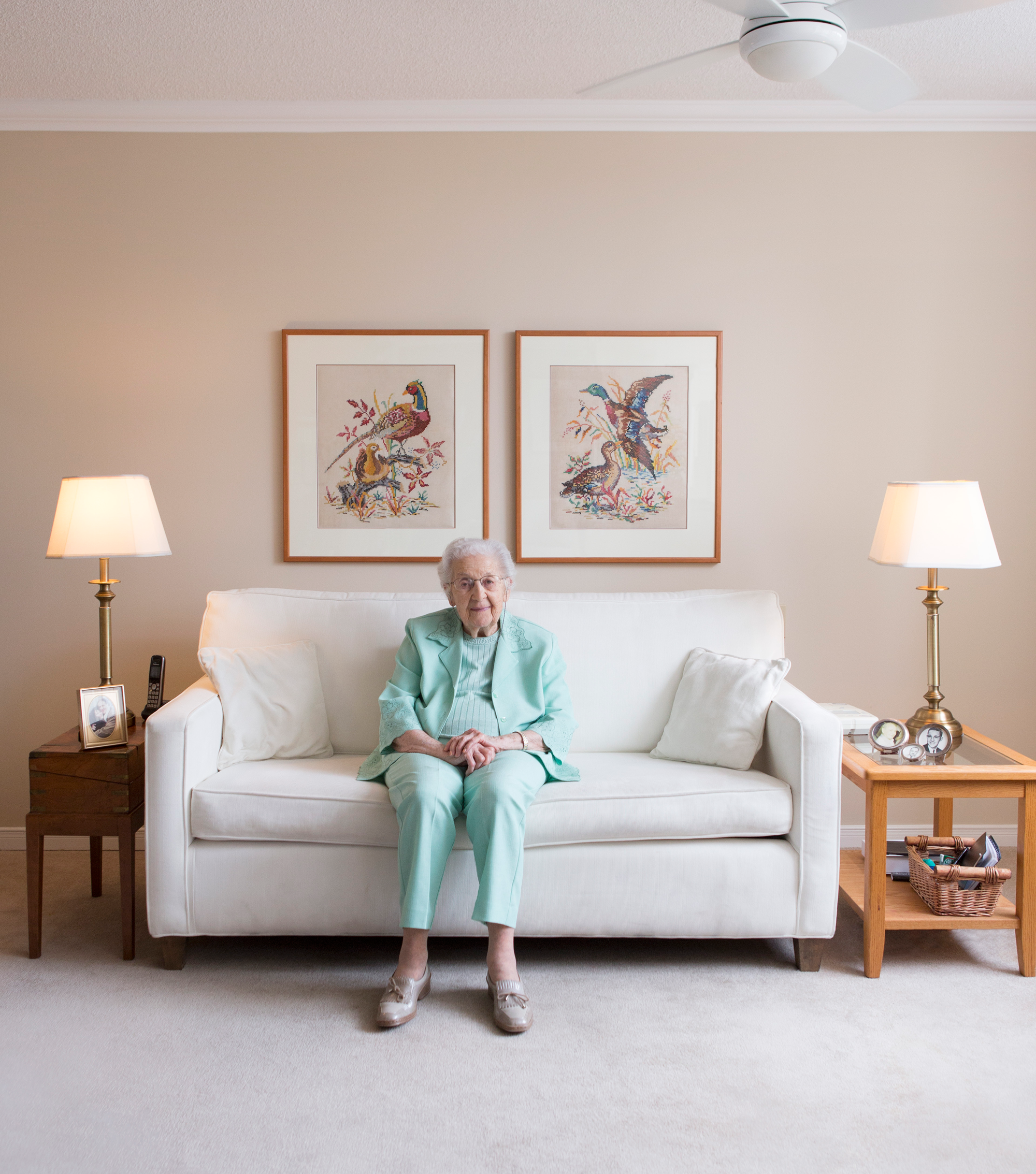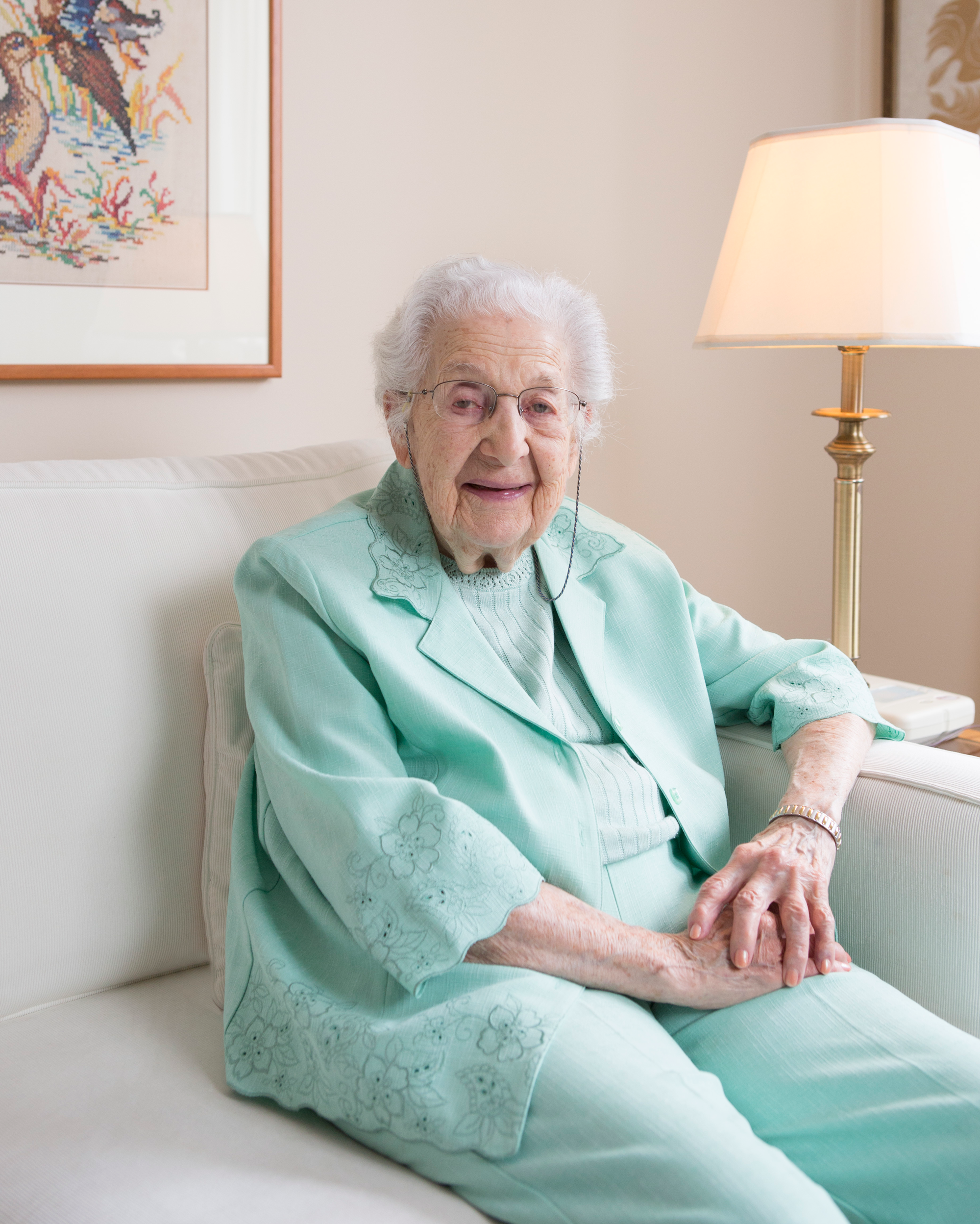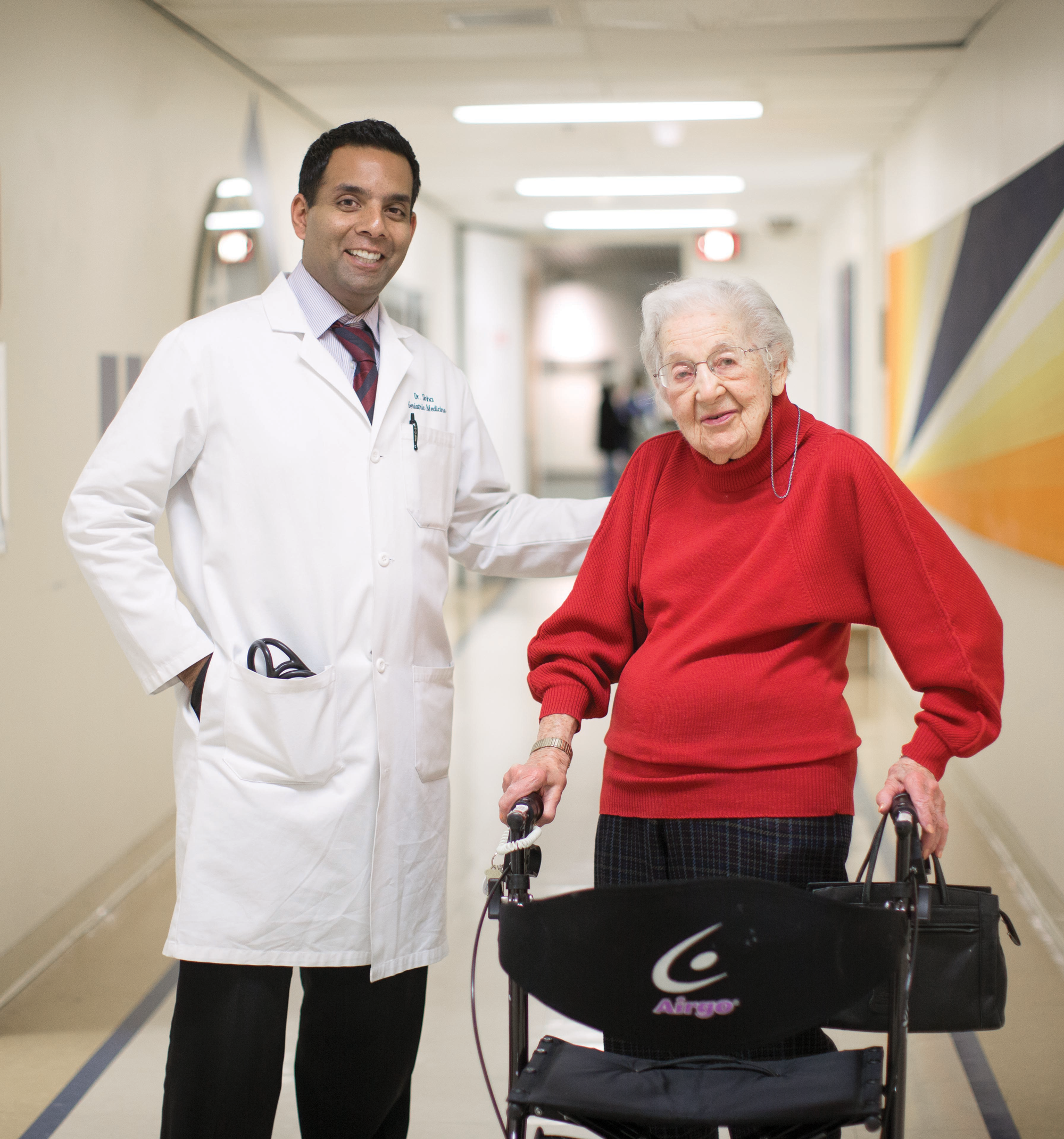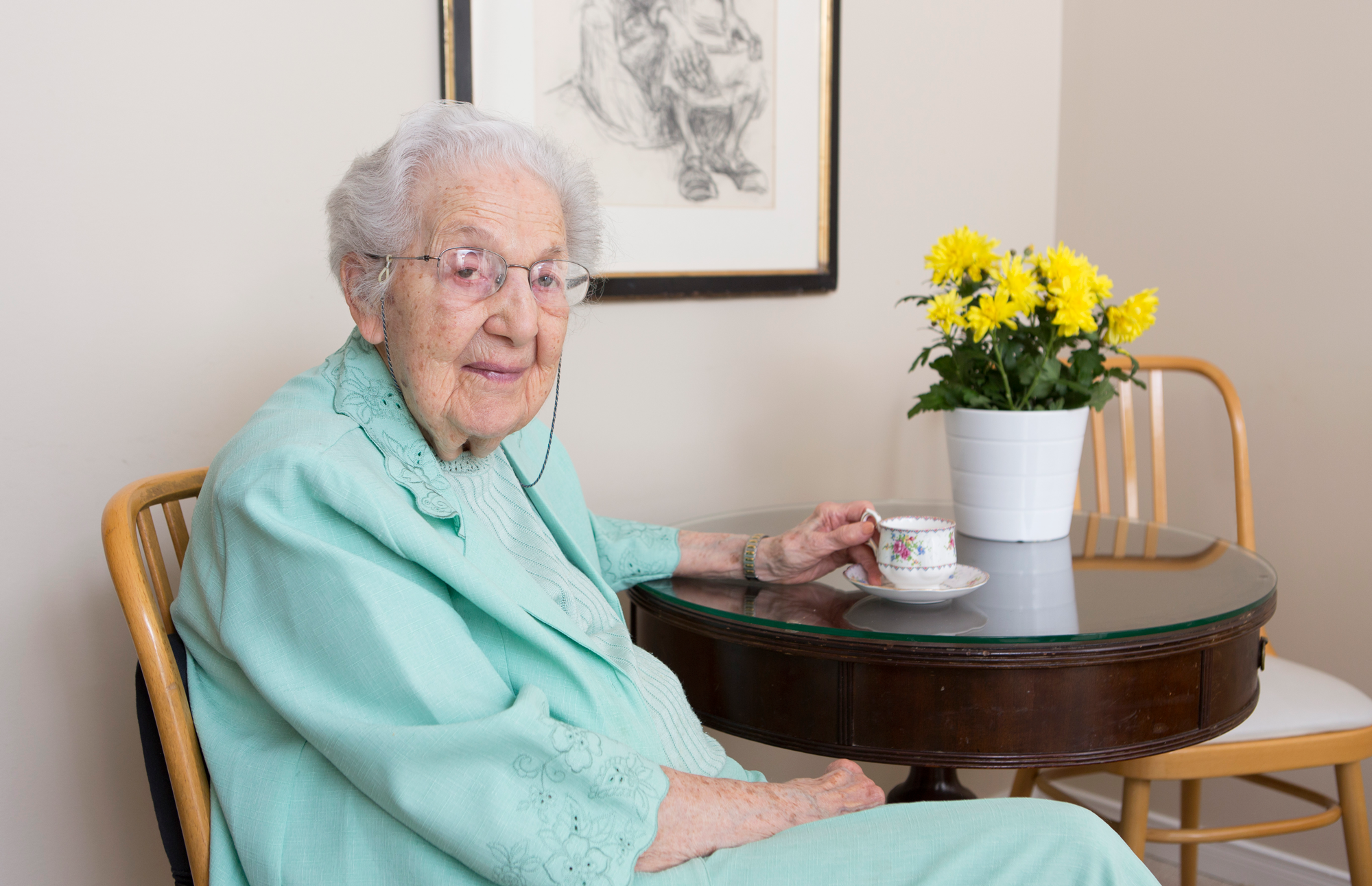 Photo credit: John Packman
Photo credit: John PackmanWritten By: Veronika Izabela Bryśkiewicz
When you ask Min Bierstock-Katz what it’s like to be 99 years old, she will say, pointing to her head: “You don’t feel 99 up here, but your body’s telling you that you are. And you’re ignoring it.”
Min, one of Sinai Health System’s oldest patients, lives independently in a small but comfortable one-bedroom apartment in a Forest Hill retirement home. In 2011, when she was 94, she accompanied her younger cousin Violet to an appointment with a new geriatrician at Mount Sinai Hospital — a then 34 year-old by the name of Dr. Samir Sinha.
Dr. Sinha — who now serves as Sinai Health System’s Director of Geriatrics and Peter and Shelagh Godsoe Chair in Geriatrics — had established the hospital’s first geriatric medicine outpatient clinic, part of the new Healthy Ageing and Geriatrics program. His vision was to provide a holistic approach to care for older patients, taking into account that many of them have complex health issues requiring continued follow up and support. Violet had expedited the clinic’s opening by convincing Dr. Sinha just how much such an approach would help keep her, and older patients like her, out of hospital.
Min at the time was merely looking for advice on how to stay healthy and independent, and the concept of what the clinic was offering — overall care for people in her age group — seemed like a sensible idea. But, because both geriatricians and comprehensive care clinics are so rare in Canada, she didn’t entirely know what to expect.
Since launching in 2010, the Healthy Ageing and Geriatrics program has burgeoned into a core focus of Sinai Health System. It is now considered to be best-in-class in the country, thanks in part to the compassionate, whole-person approach that Dr. Sinha and his interprofessional colleagues lead and support. And, as the number of older patients being admitted to hospital increases, the demand for its comprehensive services only continues to grow.
“ACE”ing elder care
Older Canadians are now the fastest growing segment of the population and the greatest users of health-care services. When Medicare was founded half a century ago, the average Canadian was 27 and could expect to live until their late 60s. Today, Canadians can live to 81 years of age or longer.
While representing only 16 per cent of the population, older adults account for more than half of all hospital stays. In the last five years alone, the number of older patients admitted through Mount Sinai’s Schwartz/Reisman Emergency Centre has increased by 53 per cent.
Thanks to the generous support of Ben and Hilda Katz, Mount Sinai’s award-winning approach to elder care — which Dr. Sinha coins the “Acute Care for Elders” (ACE) Strategy — has been shifting the health-care system to accommodate this changing need. Through the leadership of the Hospital’s Geriatrics Steering Committee, all frontline staff in every area of the Hospital are trained to meet the unique needs of older patients in a holistic way. Even simple changes like enabling older adults to be more active where possible, rather than staying bed-bound, can speed up their recovery, shorten hospital stays, and decrease their likelihood of hospital readmission.

Above: Min, still healthy and independent at 99 years old, lives in a one-bedroom apartment in a Forest Hill Retirement Community. Photo credit: John Packman
ACE’s success is also thanks in part to its strong ties to community programs that serve seniors, creating a seamless continuum of care. When their patient is admitted to hospital from a community partner, the entire geriatrics team is automatically notified and, when necessary, pulled into the patient’s care. This continuum, spanning the emergency department, inpatient and ambulatory programs, and into the broader community, ensures that now, more than ever, older patients will receive the right care in the right place at the right time. It comes as no surprise that patient satisfaction among older patients at Mount Sinai is at a staggering 97 per cent.
Embracing complexity
Dr. Sinha had always been drawn to the elderly because, he says, they are completely undervalued by society. “Our society looks at aging like a disease,” he says, “but I like to look at it as a triumph.” He felt that through geriatrics, he could make an enormous difference. Doctors who specialize in the care of older patients are a rare breed: of the 75,000 physicians in Canada, only 250 are geriatricians.
“Geriatrics is a specialty that gives us permission to care for the whole patient,” he explains. “What differentiates us from other medical specialties is that we think broadly about how complex health and social issues inter-relate. While each of the “ologies” looks after a specific disease or part of the body, we need to be masters at embracing complexity.”
Dr. Sinha is just as much a physician as he is a liaison, patient advocate and “air traffic controller,” coordinating and managing the flow of pertinent information about his patients.
On a given day his activities may vary widely, from consulting his patients individually; connecting with leaders of community programs; emailing a colleague in a different specialty to suggest tweaks to a patient’s medications; or even harnessing an entire team to confer around the best approach to someone’s care.
Thanks to Dr. Sinha and his team’s ability to see the bigger picture, they were able to get to the root of the problem when a virus left Min so ill that she was unable to walk, sleep, or leave her bed, losing the spark that she was known for by friends and family.
“I’ve never seen my mother like that,” recalls Min’s daughter Arei. “She’s an extremely strong woman, quite determined to overcome. But that was the absolute lowest I’ve seen her.”
A quick call to the clinic, and a team of specialists was gathered together and beamed into Min’s retirement home, thanks to a government-funded telemedicine initiative for older homebound patients that Mount Sinai was asked to pioneer. The team — consisting of Dr. Sinha, a geriatric psychiatrist, social worker, pharmacist, community care coordinator and others — collectively interviewed Min and her family from her living room with the help of a telemedicine nurse. Within an hour, they established a plan to get her better. They were thrilled when, a few months later, Min was back to her old self, just in time to celebrate her 99th birthday.

Above: Min has been a patient of Dr. Samir Sinha's since 2011. Photo credit: Brian Mosoff
“The program is really a collaborative service between generations,” says Arei. “They are not just servicing the elder, they are providing assistance to me so that I can input more information to them, and they can respond more appropriately to my mother.
“Imagine how frightening it is to start losing the abilities to take care of yourself. Maybe you can’t hear as well, or move as easily. Think about how difficult it would be to navigate all of the different medical specialties and services. Having everything in one place is such a huge help and relief for an older person.”
Since then, the program has received more government funding to expand, and just recently launched its Independence at Home Community Outreach Team which enables specialized, interprofessional teams to visit and treat seniors directly in their homes. Although they were unable to offer this service to Min at the time, it will be available for her, and other patients, into the future.
A broader perspective on aging
Dr. Sinha and his team receive emails and phone calls every week from institutions throughout Canada — and around the world — that seek to implement elements of the ACE Strategy. Thanks to a $1 million investment from the federal government’s Canadian Foundation for Healthcare Improvement and Canada’s Frailty Network, experts from Sinai Health System will coach 17 hospitals across Canada, plus one in Iceland, to replicate the ACE geriatric care practices, forming a so-called “ACE Collaborative.”
Looking at aging from an even broader context, this past February Sinai Health System launched Canada’s first National Institute on Ageing — a partnership between Sinai Health System, Ryerson University, the City of Toronto, Ontario Gerontology Association and the International Federation on Ageing.
The Institute will conduct cross-disciplinary research into the physical, social, psychological and financial wellness of seniors. Its mandate will be to help keep older Canadians independent, engaged and productive. Sinai Health System will lead critical geriatrics health research and policy initiatives that will help to improve the lives of all aging Canadians.
 Photo credit: John Packman
Photo credit: John Packman
“The program is really a collaborative service between generations. They are not just servicing the elder, they are providing assistance to me so that I can input more information to them, and they can respond more appropriately to my mother.”
Arie Bierstock, Min's Daughter
Paying it forward
Part of Dr. Sinha’s success goes beyond big-picture vision and strategy, and is quite simply the real, human connection he fosters with his patients and their families. Shortly after joining his clinic, Min came to him with a different kind of problem. She had picked up a brochure that showed an older man looking at the money he had available to him, trying to decide whether to spend it on medication or lunch for his wife. The image moved her so much that she asked Dr. Sinha if there was something he could do to help her help others in greater need.
He put Min in touch with Stacy Landau, the CEO of SPRINT Senior Care, a not-for-profit community agency in her area that provides community and home support services to the elderly and persons with disabilities. SPRINT was already partnering with Mount Sinai to deliver a community program called House Calls, providing older homebound patients with primary care.
Eventually Min, with the help of her daughter and retirement home staff, was running awareness initiatives, food drives, and fundraisers including jewellery sales, through an initiative called “We Care — Seniors Helping Seniors,” to help raise funds for the less fortunate elderly, donating the proceeds to SPRINT. Revera — the company that owns Min’s retirement home — matched the money raised from one of her major jewellery fundraisers.
In paying it forward, Min and her daughter have become key partners in Sinai Health System’s push to support healthy aging and independence for all Canadians.
“We are facing such a huge demographic shift,” says Arei. “I’m very grateful that Sinai Health System is taking on this work because I’m next! I truly hope this approach to care will spread everywhere — we’re going to need it.”
Min chimes in: “Dr. Sinha is one young man who has come in, and has reached so far. I would really love to see his work continue to grow and grow and grow.”
*Sadly, Min passed away on September 24, 2016, just 9 weeks away from celebrating her 100th birthday.




